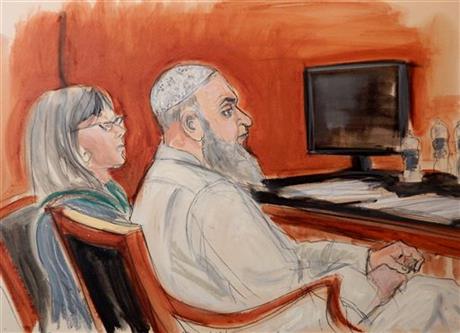
By TOM HAYS and LARRY NEUMEISTER
A former top aide to Osama bin Laden was given life in prison for the 1998 bombings of two embassies in Africa, a sentence handed down Friday in a U.S. courtroom where he was confronted by a woman who was blinded in one of the attacks and others who lost loved ones.
“I worship the same God as you,” said Ellen Karas, directly addressing Khaled al-Fawwaz. “But he is not an angry God. He is not a vengeful God.”
Edith Bartley, whose father and brother were killed in the same attack in Kenya that scarred Karas, told the judge al-Fawwaz deserved a life term.
“He has had his day in court,” she said. “In spite of that, Your Honor, this man stands before you unrepentant.”
Al-Fawwaz, 52, was arrested in London weeks after the August 1998 attacks but was not extradited from Great Britain until 2012. He was convicted in February of terror charges accusing him of supporting the attacks in Kenya and Tanzania that killed 224 people, including a dozen Americans.
At trial, prosecutors presented evidence the Saudi Arabia-born defendant was an al-Qaida leader who directed a military training camp in Afghanistan in 1991, led a terror cell in Nairobi, Kenya, in 1993, and ensured bin Laden’s 1996 declaration of war against the U.S. reached the world. The evidence included a list of al-Qaida members — with al-Fawwaz at No. 9 — that was recovered by U.S. special forces from an al-Qaida leader’s home after the Sept. 11 attacks.
The defense accused the government of exaggerating al-Fawwaz’s role in the conspiracy and had sought a sentence less than life. On Friday, he got permission from the judge to turn and face about two dozen victims sitting in the audience.
“I can’t find words to describe how terribly sad and sorry I am,” al-Fawwaz told them. “I don’t support violence. … I hope one day people will find other ways to live with their differences other than violence.”
U.S. District Judge Lewis Kaplan responded by telling al-Fawwaz he didn’t believe him, adding, “Obviously, the jury didn’t share that picture of you.”
To carry out a global jihad against the U.S., al-Qaida relied on people like al-Fawwaz to train and oversee killers, to publicize and glorify deadly acts, to vet reporters and media, and to supply al-Qaida with technology, information and equipment, prosecutors said in court papers.
“You were all in on that program,” Kaplan told the defendant.
Al-Fawwaz had been scheduled to stand trial with Abu Anas al-Libi — who was snatched off the streets of Libya in 2013 — but al-Libi died in January after a long illness. Another co-defendant, Egyptian lawyer Adel Abdul Bary, was sentenced in February to 25 years in prison after he pleaded guilty.
U.S. Attorney Preet Bharara said in a statement that the life sentence for al-Fawwaz was justified.
The defendant “conspired with a murderous regime, and the result was a horrific toll of terror and death,” he said. “The price he will pay, appropriately severe as it is, cannot possibly compensate his victims and their families.”
In her remarks, Karas described being pulled out of the rubble in Nairobi and spending months in the hospital. She underwent multiple surgeries that failed to restore her sight.
“I had a career ahead of me. It’s gone. Now I have a guide dog,” she said of the black Labrador at her side.
Karas called herself and other survivors living proof that “Osama bin Laden didn’t win. We are all here. He is gone. And thankfully it will stay that way forever.”



